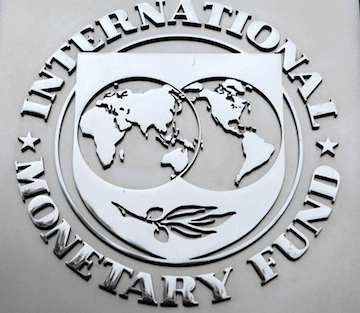Medium-term economic risks tilted to downside and geopolitical tensions rising – IMF
 The International Monetary Fund (IMF) has warned that despite global upswing in economic activity continuing, and the outlook strengthening, with pickup in investment, trade and industrial production with confidence rising, economic recovery is not yet complete and potential growth remains weak.
The International Monetary Fund (IMF) has warned that despite global upswing in economic activity continuing, and the outlook strengthening, with pickup in investment, trade and industrial production with confidence rising, economic recovery is not yet complete and potential growth remains weak.
“Near-term risks are broadly balanced, but there is no room for complacency because medium-term economic risks are tilted to the downside and geopolitical tensions are rising,” the Fund said in a communiqué issued Saturday October 14, 2017 after the 36th Meeting of the International Monetary and Financial Committee at the IMF/World Bank Spring Meetings in Washington DC, USA.
The Meeting notes that the welcome upturn in global activity provides a window of opportunity to tackle key policy challenges and stave off downside risks, including by ensuring appropriate buffers, and to maximize returns on structural reforms to raise potential output.
“We reinforce our commitment to achieve strong, sustainable, balanced, inclusive, and job-rich growth. To this end, we will use all policy tools—monetary and fiscal policies and structural reforms—both individually and collectively. We will work together to reduce excessive global imbalances in a way that supports global growth by pursuing appropriate and sustainable policies,” the Central Bank Governors said, noting that, “Strong fundamentals, sound policies, and a resilient international monetary system are essential to the stability of exchange rates, contributing to strong and sustainable growth and investment. Flexible exchange rates, where feasible, can serve as a shock absorber. We recognize that excessive volatility or disorderly movements in exchange rates can have adverse implications for economic and financial stability.”
“We will refrain from competitive devaluations, and will not target our exchange rates for competitive purposes. We reaffirm our commitment to communicate policy stances clearly, avoid inward-looking policies, and preserve global financial stability. We welcome the conclusions of the G-20 Hamburg Summit on trade and are working to strengthen its contribution to our economies,” the Meeting agreed.
The communiqué asked that monetary policy should remain accommodative, where inflation is still below target and output gaps are negative, consistent with central banks’ mandates, mindful of financial stability risks, and underpinned by credible policy frameworks.
“Monetary policy, however, must be accompanied by other supportive policies. Fiscal policy should be used flexibly and be growth-friendly, while enhancing resilience, avoiding procyclicality, and ensuring that public debt as a share of GDP is on a sustainable path. To boost productivity and promote inclusiveness, fiscal policy should prioritize high-quality investment, support structural reforms, including more efficient tax systems, and promote labor force participation. Structural reforms, well-sequenced and adapted to individual country circumstances, should aim to lift productivity, growth, and employment; promote competition and market entry; and enhance resilience, especially given present high debt levels, while effectively assisting those bearing the cost of adjustment,” it added.
The Meeting among others called on the IMF to provide member-tailored advice on the policy mix to deepen the global recovery, and expressed support for the work on fiscal rules and medium-term frameworks and the application of the fiscal space framework in bilateral surveillance.
“We support efforts to further enhance surveillance activities, including embedding analysis of macro-financial issues in IMF surveillance. We look forward to the Interim Surveillance Review, which will take stock of the IMF’s policy advice across the membership. We welcome further work on the impact of prolonged low interest rates and the role of macroprudential policies. We support continued progress toward addressing data gaps,” it said.
Additionally, the meeting urged the IMF to continue to analyze the causes of the productivity slowdown and the measurement challenges of the digital economy, and help members identify structural reform priorities and analyze their impact on macroeconomic resilience.
“We support drawing lessons from applying the Infrastructure Policy Support Initiative in surveillance and work updating the framework for assessing public infrastructure management. We welcome the IMF’s continued support to the G-20 Compact with Africa initiative to improve investment frameworks and foster private sector investment,” it said.
By Emmanuel K. Dogbevi
